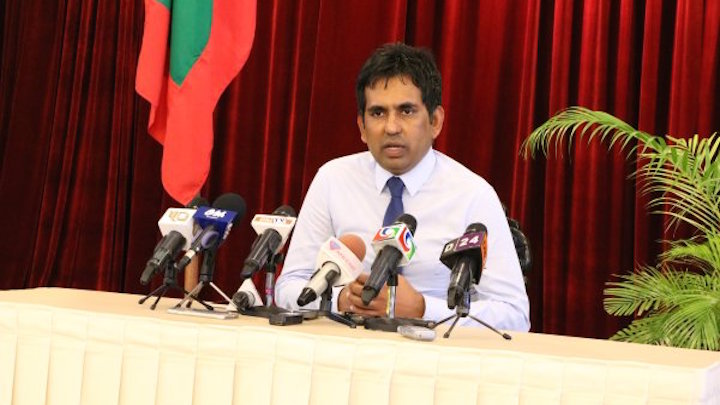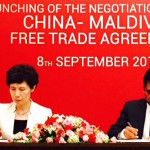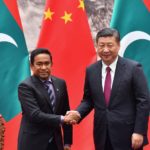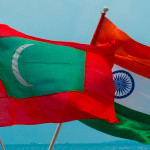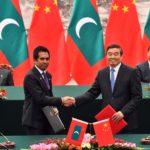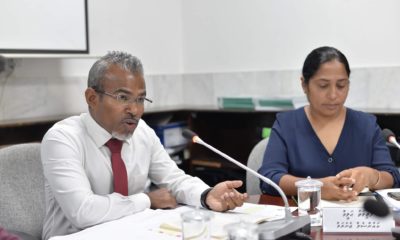The government is hopeful of signing a free trade agreement with China by early 2017 and securing duty-free status for Maldivian exports.
Briefing the press after the first round of negotiations concluded at the Bandos Island Resort on Tuesday, Economic Development Minister Mohamed Saeed said a free trade pact with China will be most beneficial to Maldivian businesses that export fish products.
“Our main aim is to export [fish products] to the China market without any tariffs,” he said.
The Maldives’ main export is fish, primarily skipjack or yellowfin tuna, either processed and canned or sold fresh to overseas markets at a premium due to sustainable pole-and-line fishing techniques.
An agreement with China would be the Maldives’ first bilateral free trade deal. The Maldives had previously only signed the regional South Asian Free Trade Area agreement.
A joint statement released after the first round of talks stated that both sides “agreed to pursue the negotiations with the spirit of reaching a high quality and mutually beneficial agreement that is in line with [World Trade Organisation] principles on multilateral trading.”
The decision to pursue a free trade agreement was made during Chinese President Xi Jinping’s historic state visit to the Maldives in September 2014.
The Maldives also agreed to become a partner in China’s maritime silk route and the Chinese government pledged US$100 million as grant aid for the construction of a bridge connecting Malé and the reclaimed island Hulhumalé. The Chinese CCCC Second Harbour Engineering Company is set to begin work on constructing the US$200 million bridge next month.
In June this year, President Abdulla Yameen declared that Sino-Maldives relations are at an “all-time high” with the establishment of a cooperative partnership between the countries last year.
Yameen also accused the European Union of imposing restrictions on Maldivian fish exports over the government’s refusal to legalise same-sex marriage and freedom of religion. The government is “looking east” for development partners as economic cooperation with China does not involve the same challenges to remaining an Islamic state posed by “Western colonial powers,” he said.
Yameen, whose administration has been besieged by multiple political crises, has repeatedly slammed alleged interference in domestic affairs by Western countries, especially since the imprisonment of former President Mohamed Nasheed and other politicians earlier this year.
Speaking at the opening ceremony of the ‘Expo Maldives 2015’ handicraft exhibition on Tuesday night, Yameen said the government is seeking new premium markets for Maldivian canned tuna, including Middle Eastern countries as well as the US and Canada.
Until January 2014, fish exports to the EU – the single largest export partner by value – were duty-free under the Generalised System of Preferences programme, a non-reciprocal trade agreement extended to developing countries.
The government’s application for a year’s extension under the ‘GSP Plus’ programme was declined as it had not ratified all 27 required international conventions. The Maldives holds reservations concerning the freedom of religion component of the International Covenant on Civil and Political Rights.
Yameen meanwhile went on to say that a free trade agreement with China should not be a “cause for concern” despite the potential loss of revenue from import duties.
The government earns a “sizeable” amount as revenue from import duties, Yameen said, but was no longer as dependent on tariffs since the introduction of new taxes.
On the other hand, the public would benefit from the availability of cheaper goods, he said.
In his remarks at the ceremony, Saeed meanwhile noted that negotiations on the China-Australia free trade agreement took 15 years.
China is the largest manufacturing economy in the world and second largest importer of goods. China is also the world’s fastest growing consumer market.
After becoming a member of the World Trade Organisation in 2001, China has signed free trade agreements with several nations, including Australia, South Korea, and Switzerland.
The second round of negotiations for the China-Maldives free trade agreement is due to take place in Beijing from February 29 to March 4.
Hong Xiaodong, deputy director general of the department of international trade and economic affairs at the ministry of commerce, led the Chinese delegation at the first round of negotiations in the Maldives.

